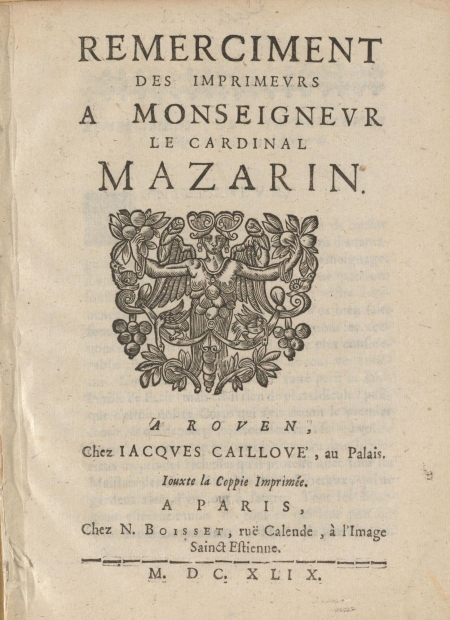
The French civil wars of 1648 to 1653, collectively known as the Fronde, were fought with the pen and press as well as the musket and sword.
During this turbulent period, presses in Paris and (to a lesser extent) the provinces churned out thousands of libelles, small-format pamphlets targeted at political figures. By far the most popular target of the pamphleteers’ biting accusations was the Cardinal Jules Mazarin. Hence, these tracts are known as the Mazarinades.

Mazarin served as the chief minister of France during the minority of Louis XIV. Along with the young king’s mother, Anne of Austria, Mazarin sought to continue the work of his predecessor Cardinal Richelieu in expanding the already great authority of the Crown. His efforts were met with waves of violent opposition spearheaded by rebellious nobles.
The stakes were serious, but the tone of the pamphleteers’ attacks on the unpopular Mazarin is overwhelmingly one of caustic humor. In burlesque verse or satirical prose, their authors lampoon Mazarin’s efforts to fill his personal coffers at the expense of the nation, and accuse him of having a sexual relationship with the queen. They mock his Italian accent, and his perceived foppery: one Mazarinade describes him as a “drinker of lemonade/and inventor of pomades” (“Le Passe-port, et l'adiev de Mazarin : en vers bvrlesqves”).
While some professed themselves to be scandalized by the crude content of the libelles, they were undoubtedly in high demand. Between 5,000 and 11,000 were circulated. It was said that “half of Paris prints or sells what is printed; the other half writes it” (“Remercîment des imprimeurs à Monseigneur le cardinal Mazarin”).
Houghton Library’s collection of Mazarinades, 3,902 pieces in all, is one of the largest outside of France. It includes texts by the most famous pamphleteers, such as Saint-Amant, Scarron, and Loret, and work attributed to Cyrano de Bergerac. It also features some curious documents that are a testament to the creativity of the pamphleteers: acrostics, irreverent plays on the catechism, and discourses attributed to ghosts and infants.
The documents were intended for immediate public consumption, a fact that is reflected in their form. They typically range from four to eight pages, and feature eye-catching typography and title vignettes.
Hastily composed and hastily printed, they offer a lively, unpolished glimpse of the spirit of Fronde.
Accessing These Materials
The most critical resource for researchers remains Célestin Moreau’s monumental three-volume Bibliographie des Mazarinades (Renouard, 1850–1851), in which the Mazarinades known to Moreau are briefly described and (often amusingly) evaluated.
Moreau assigned to these Mazarinades a single number by which they are universally identified. Houghton's collection can be browsed in HOLLIS through the call number FC6 M456m, followed by the Moreau number.
James E Walsh’s Mazarinades: A Catalogue of the Collection of 17th-Century French Civil War Tracts in the Houghton Library, Harvard University (G.K Hall & Co, 1976) lists all of the tracts then owned by Harvard, some of which are housed at Houghton and some of which may be found at the Harvard Law School Library or the Kress Library of the Harvard Business School.